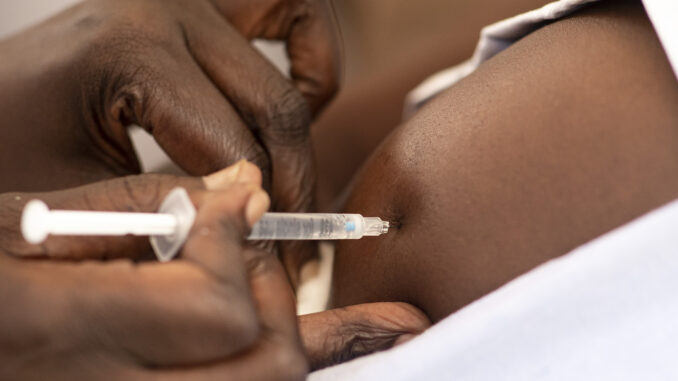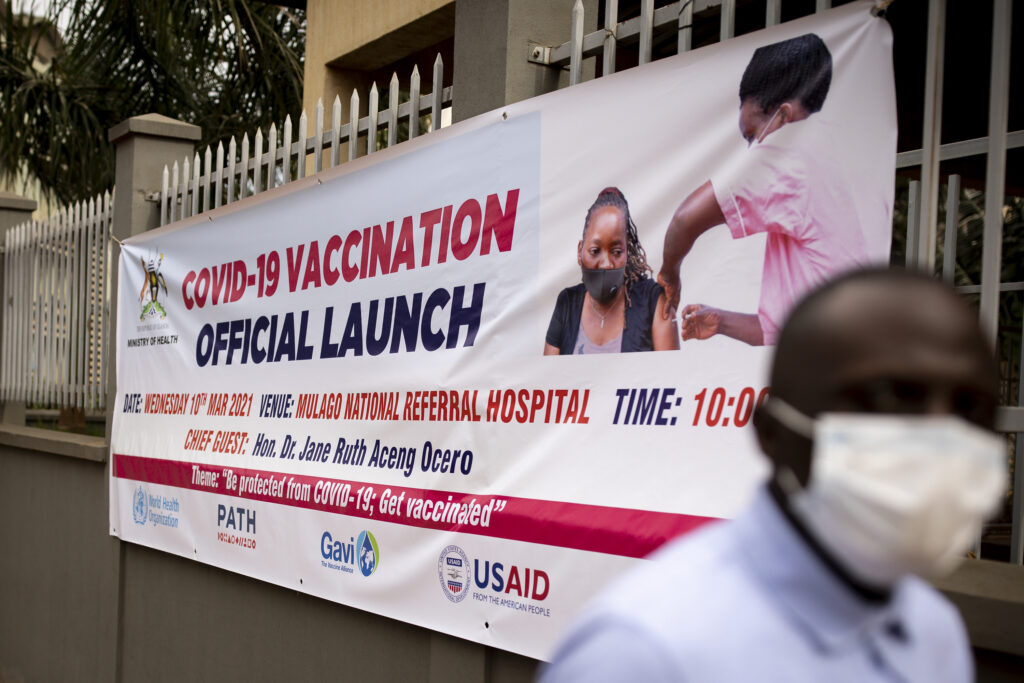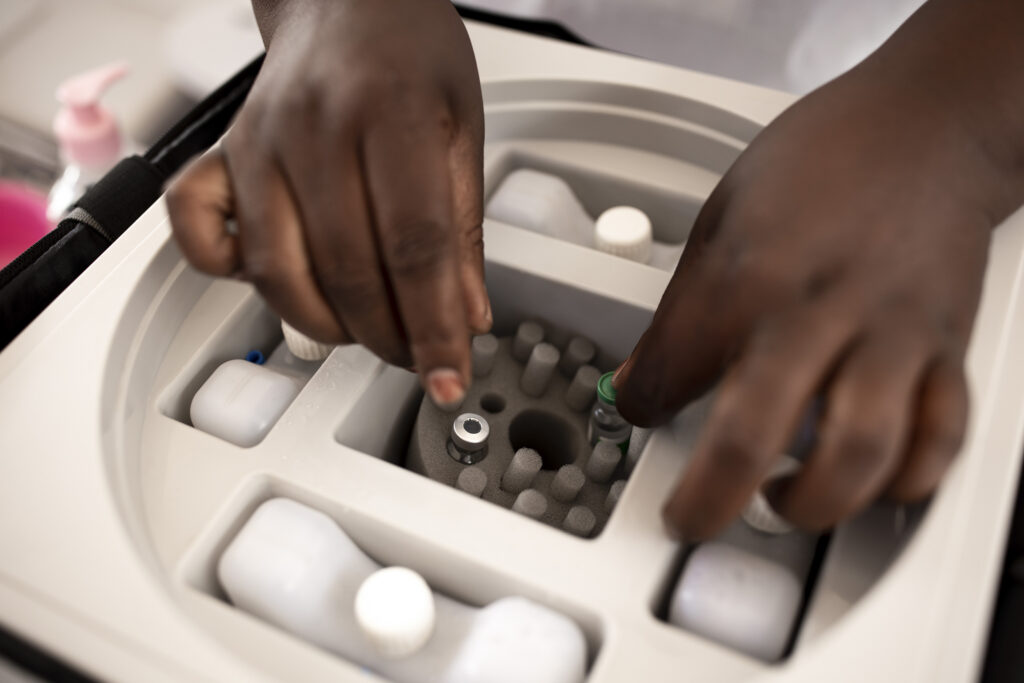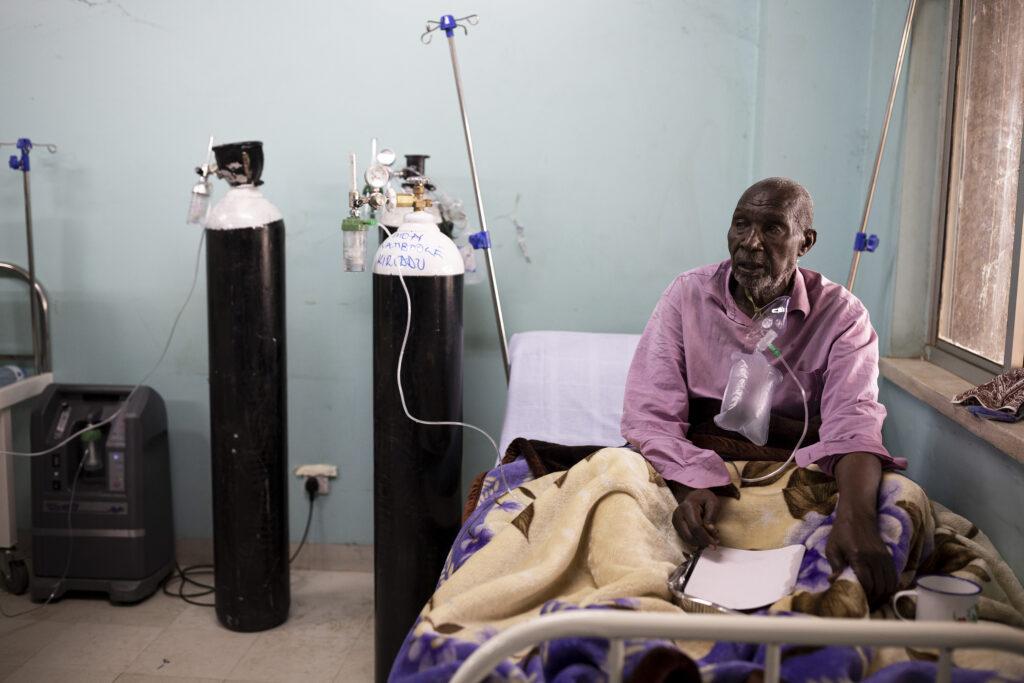
KAMPALA, Uganda — Siraje Bukenya, a councilor in Uganda’s capital, Kampala, was among the first to receive the opening jab of the Covid-19 vaccine when the government started mass vaccination on March 10, 2021.
However, he now fears going for the second dose after investigations revealed that at least 800 people in the country got injected with fake Covid-19 vaccines.
“I was thrilled and felt protected after I got vaccinated, but now I’m quite frightened,” he told Zenger News.
“If our government doesn’t tackle this issue firmly, people will fear getting vaccinated. How can health workers inject people with fake vaccines? We, leaders, ought to fight this menace.”
The Uganda State House Health Monitoring Unit, the police, and officials from the Ministry of Health, revealed that over 800 people got injected with water, according to tests done by the Directorate of Government Analytical Laboratory.
Fraudsters targeted people desperately looking for vaccines when the country ran short of them during a period when the number of new infections reached an all-time high of roughly 1,700 per day, said Warren Naamara, the director of the Health Monitoring Unit.

“The police arrested two nurses, and another one is on the run,” he told Zenger News.
Two nurses from Nakawa, Kampala, were detained by State House investigators on June 30, 2021, and remanded to Kitalya Prison.
“They targeted anyone looking to pay for immunizations, including corporate employees. These fake vaccines were given out in May and June when we had a fatal coronavirus outbreak.”
He said tests showed the fake vials contained no harmful substances.
Authorities say the scammers charged between Sh80,000 [$22] and Sh500,000 [$141] for a single bogus shot.
Stephen Kisuze, the chief Information, Communication & Technology officer at the National Medical Stores, said the arrested nurses did not get the materials used to make the fake vials from government stores.
“Further, the medications lacked government labeling, as required by law,” he said. The National Medical Stores is a government institution tasked with obtaining, storing, and distributing pharmaceuticals.
Uganda is gripped by the second wave of the Covid-19 pandemic, forcing President Yoweri Kaguta Museveni to reimpose a countrywide lockdown on June 18, 2021.
The country received 864,000 doses of the Oxford-AstraZeneca vaccine in March 2021 via the Covax facility and another 175 200 doses in June 2021. The government has vaccinated 1,135,036, according to the Ministry of Health.
Uganda’s first phase of the Covid-19 vaccination targeted only people at risk like health workers, the elderly, politicians, people with disabilities, and teachers. It did not include children and the public.

Government hospitals are full of Covid-19 patients, but ordinary Ugandans worry that private hospitals will take advantage of them, as with the fake vaccines.
Solome Muhereza Busingye, a seasoned health practitioner, advised Ugandans to shun private hospitals that charge for the vaccinations.
“People should not pay for the Covid-19 vaccines,” she told Zenger News.
“The vaccines purchased for a fee are fake. Crooks are enticing our nurses into administering fake vaccines. Ugandans should wait till the government does mass vaccination. Nurses should also follow work ethics and avoid fake scams.”
Jesus Mere, also a health practitioner who took the first dose of the Covid-19 vaccine, advised the government to bar private hospitals from vaccinating people.
“In light of the negative reports we receive on how private hospitals have handled Covid-19, government health institutions should be the only ones doing public vaccinations,” he told Zenger News.
“The government should also organize outreaches and inform people the importance of getting vaccinated to restore public trust in the Covid-19 inoculation exercise.”
Warren Kizza Besigye Kifefe, Museveni’s former personal doctor and four-time presidential challenger, said the country conducted the Covid-19 exercise wrongly.
“Those in leadership are doing very little to fight Covid-19 because they don’t have that capacity to do so and are not even prepared to fight this pandemic,” he told Zenger News.
“We needed a mass vaccination in this regard, but as you know, expect nothing much with the corruption in this country. Through local media platforms, I have taught our people how to use remedies to boost their immunities. Unfortunately, due to the weaknesses described, the second wave arrived when government readiness was not substantially different from March 2020, and the population had grown far more vulnerable.”

Like Jimmy Odoki Acellam, a program coordinator at Heartsounds Uganda, a mental health non-governmental organization, some Ugandans believe the victims of the fake Covid-19 jab could be higher.
“This will discourage some Ugandans from going for vaccination, but I will monitor media reports on the distribution of the next batch of vaccines,” he told Zenger News.
When Covid-19 broke out in March 2020, Museveni appealed for national solidarity to support the healthcare system, which was already in crisis due to funding constraints.
Hundreds of businesses and individuals responded by donating millions of shillings and automobiles to the hastily established National Response Fund to Covid–19 in the Office of the Prime Minister.
The government’s administration of Covid-19 resources, on the other hand, has been cloaked in secrecy, raising doubts about accountability and transparency.
The government borrowed $888 million—approximately Sh3.3 trillion, or seven percent of 2020/2021 national budget—to boost economic recovery and respond to the Covid-19 pandemic, according to an audit report.
Millions of shillings were wasted or stolen, according to the Budget Monitoring and Accountability Unit of the Ministry of Finance and Economic Development.
“That’s what happens when corruption reaches high offices, and the mafia starts controlling the Finance Ministry,” Livingstone Sewanyana, executive director of the Foundation for Human Rights Initiative, told Zenger News.
“A study conducted in November 2020 by the government’s own Uganda Bureau of Statistics found that 74 percent of Ugandans believed that the Covid-19 funds would not reach them because the powerful mafia would steal them. Ugandans should be worried and demand accountability.”
(Edited by Kipchumba Some and Amrita Das)
The post Over 800 Ugandans Injected With Water In Covid-19 Vaccination Scam appeared first on Zenger News.
